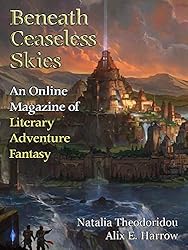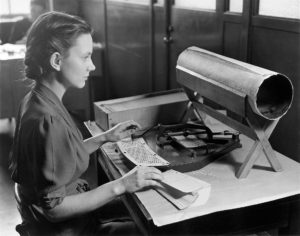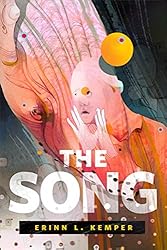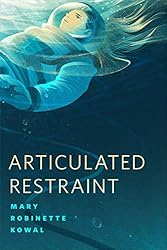
![]() “Do Not Look Back, My Lion” by Alix E. Harrow (2019, free in Beyond Ceaseless Skies, Issue #270, Jan. 31, 2019; 99c Kindle magazine issue)
“Do Not Look Back, My Lion” by Alix E. Harrow (2019, free in Beyond Ceaseless Skies, Issue #270, Jan. 31, 2019; 99c Kindle magazine issue)
“Do Not Look Back, My Lion,” begins and ends with Eefa leaving home — she cannot bear to see her daughters and wife march to war any longer, is tired of her wife’s promises that this child (and this child and that child) will be the last marked at birth for service in the Emperor’s endless armies, is tired of being the only worshipper in the lonely Temple of Life while the Temple of Death’s “floor is gummed with the blood of hens and calves and the air is heavy with char.” Eefa, a talented healer, doesn’t have the heart or the stomach to support a faraway war that seems it will last for eternity. Eefa’s wife, Talaan, is the Emperor’s favorite, a fearsome warrior who has borne strong daughters, who have all become feared warriors in their own right. How can anyone, particularly a gentle soul with a lamed leg, stand against a society so hungry for blood and death that it only exalts those who kill?
When Eefa was a girl, only blooded warriors were scarred, but now every child is marked before they even speak. Promised to Ukhel, all of them. Promised to death.
“Do Not Look Back, My Lion” is a story about love. It’s about a woman who chooses to hope for the future rather than worship death. It’s about blood and war and hegemony, and it made me angry in all the best ways, because the city of Xot and the world of “Do Not Look Back, My Lion” are not so different from the world I live in, in a country which has been in a constant state of war for half my life with no signs of stopping or even winding down. Alix E. Harrow uses scalpel-sharp allegory and beautifully written prose to shine new light on a subject so old-hat that it’s barely discussed, and while she provides no easy answers, it’s comforting to know those of us who want a better future aren’t alone. ~Jana Nyman
![]() “The Song” by Erinn L. Kemper (2019, free at Tor.com, 99c Kindle version)
“The Song” by Erinn L. Kemper (2019, free at Tor.com, 99c Kindle version)
Dan is a welder on a repurposed oil rig floating in the ocean, now euphemistically called SeaRanch 18. It’s a floating slaughterhouse for whales. With animal-rights extremists bombing transports and killing the replacement staff, no one on the rig is currently being allowed to leave for a break. The rig is a depressing, awful place, and the sense of isolation is intensified in the case of Dan, whose wife died before the story begins and who seems to be marking time, not really living any longer. But then he meets Suzanne, an animal behaviorist who has been snuck onto the rig to study the whales’ song and some oddities in the whale pods’ actions, and life seems to be looking up slightly. But Suzanne is finding some disturbing things in her research, and the song of the whales seems to be worming its way into Dan’s inner soul.
“The Song” is heavy on setting and atmosphere, and scores some points about ecological concerns. The haunting whale song is echoed in the women carvers’ plaintive singing of “Oh Danny Boy” and the melancholy tunes hummed by Suzanne. I appreciated the reveal at the end on a literary level, though as a practical matter it struck me as far-fetched. It’s a fatalistic and depressing story, but since that’s clearly the intent, I have to give Erinn L. Kemper props for effectively pulling me into this story and world. ~Tadiana Jones

![]() “We Interrupt This Broadcast” by Mary Robinette Kowal (2013, free on the author’s website, originally published in The Mad Scientist’s Guide to World Domination)
“We Interrupt This Broadcast” by Mary Robinette Kowal (2013, free on the author’s website, originally published in The Mad Scientist’s Guide to World Domination)
This short story is a prequel to Mary Robinette Kowal’s LADY ASTRONAUT series, an alternative history SF series in which a huge meteorite destroyed Washington DC (along with much of the North American eastern seaboard) in 1952. “We Interrupt This Broadcast” helps set the stage for that world-changing event.
Fidel Dobes is a brilliant computer programmer, back in the days of large computers that use a series of punchcards containing the source code program for the computers. Fidel is suffering from tuberculosis, but is determined to see his personal project through before he dies. He’s carrying deep regrets for his participation in the Manhattan Project and the bombing of Hiroshima and Nagasaki.
And now … the new project. Launching bombs into space and holding them there, ready to rain terror on any country that disagreed with the United States. As if that were a surprise coming from President Dewey, an isolationist president who defeated Truman on the strength of his reputation as a “gangbuster.” His idea of foreign policy was to treat every other country like the gangs of New York.
Fidel has figured out what he thinks is a way to avoid a nightmarish future for our nation and world, but he can’t share his secret with anyone … even Mira, his assistant, for whom who he’s beginning to develop feelings. But Mira is more resourceful ― and more interested in Fidel ― than he had realized.
I don’t know if Fidel and his actions are discussed in Kowal’s The Calculating Stars, the first book in the LADY ASTRONAUT series, which begins shortly after this story ends. I haven’t read that novel (yet), but this story certainly sheds an unexpected light on the events that set up that series. It’s an interesting but somber tale, on several levels. ~Tadiana Jones
![]() “Articulated Restraint” by Mary Robinette Kowal (2019, free at Tor.com, 99c Kindle version)
“Articulated Restraint” by Mary Robinette Kowal (2019, free at Tor.com, 99c Kindle version)
Ruby Donaldson, an astronaut stationed on the Neutral Buoyancy Lab or NBL, is nursing a severely sprained ankle, which she twisted while practicing a Charleston Flip in a dance rehearsal, one of her few remaining non-work activities. She’s scheduled for an NBL training run and is planning to just grit her way through it with her sore ankle, but the training run turns unexpectedly serious: a spaceship has had a docking accident that has locked the ship to the space station and jammed the airlock. The ship’s passengers are stuck, and will run out of air in sixteen hours. The NBL and astronauts there are urgently needed to figure out a viable rescue and recovery plan though a development run or “dev run.” Because of time constraints and limitations with their EVA suits, they can’t simply replace Ruby with another person to do this vital exercise. So Ruby doesn’t tell anyone about her sprained ankle, even when things happen during the dev run that make her ankle worse, and worse …
“Articulated Restraint” is another tale set in the world of Kowal’s LADY ASTRONAUT series, and its events occur during that series. It’s a straightforward story, somewhat simplistic in its essential plot. Where Kowal shines here is in the myriad of believable scientific and technical details, and in depicting Ruby’s personality and point of view, especially her fierce determination to see this exercise through to the end. It made this story feel highly realistic, and made me more interested in picking up The Calculating Stars, which has been on my TBR list for a good long while. ~Tadiana Jones

![]() “Coke or Pepsi” by N.T. Lawrence (free at Daily Science Fiction March 15, 2018)
“Coke or Pepsi” by N.T. Lawrence (free at Daily Science Fiction March 15, 2018)
This is basically a one-joke story of alien contact and one that, unfortunately, isn’t particularly original or interesting. Worse, it’s telegraphed by the title and so one can see just where it’s going after the first sentence. Plus, it takes some tortured plotting and logic to get there. ~Bill Capossere







Do it! One of the best things I've read in recent years.
This reminds me. I want to read Addie LaRue.
We’re in total agreement David!
I felt just the same. The prose and character work was excellent. The larger story was unsatisfying, especially compared to…
Hmmm. I think I'll pass.